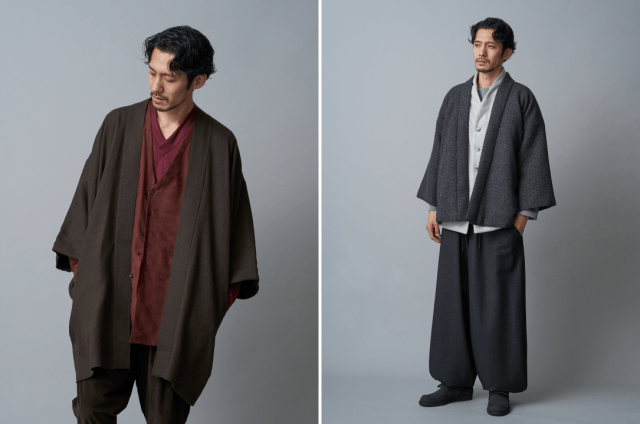
Whether you’re going completely old school or just want a touch of swordsman chic, Japanese fashion label Trove has you covered.
The weather in Japan is in that weird changing-of-the-seasons period right now. If the sun is out, it’s going to be way too hot for a full-on winter coat, but if night has fallen and the wind is blowing, you’re going to want something warmer than just a long-sleeved shirt.
But Japanese clothing label Trove is here with a new collection that’s perfect for straddling the seasons, just like how the company’s fashions themselves bridge Japan’s samurai past with its contemporary eclecticism.
Trove has made a name for itself with its Wa Robe (wa meaning “Japanese”), and the newest additions to the line combine cues from centuries-old classic aesthetics with warm fabrics that were unknown to Japan before the end of its isolationist feudal age, like with this wool haori half-coat, which is available in the samurai-shibui shades of dark brown and navy blue.
If you’d prefer something lighter and softer, the haori is also offered in a fluffy “boa” material, in a shade Trove calls “bear.”
Those looking for a more substantial overgarment can opt for Trove’s wool dotera, a padded jacket usually worn over a kimono, which comes in black or charcoal gray.
Those looking to go full-modern samurai can pair these with a pair of billowy wool hakama pants in either navy or dark brown…
…as well as retro juban straight-collared short, evocative of the top half of the thin robe traditionally worn under a kimono.
Of course, a company as open-minded as Trove doesn’t insist you having a historical theme running through your entire outfit, and even its own promotional images show items from the lineup being worn together with modern jackets and footwear.
Prices for the new items range from 12,960 yen (US$115) for the juban shirts up to 32,400 yen for the haori. Online orders can be placed here through Trove’s online shop (which also includes instructions for how to place international orders), with shipping scheduled for early December.
Source, images: Press release
[ Read in Japanese ]

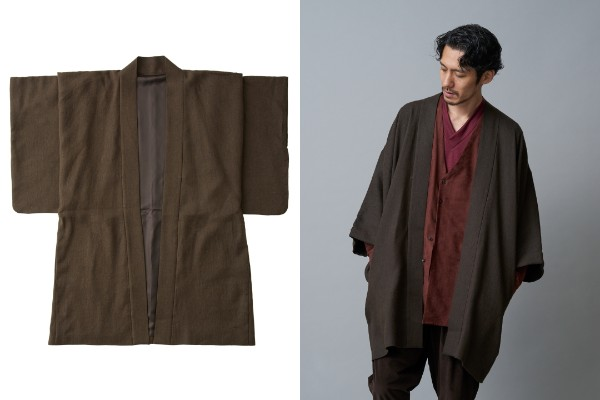
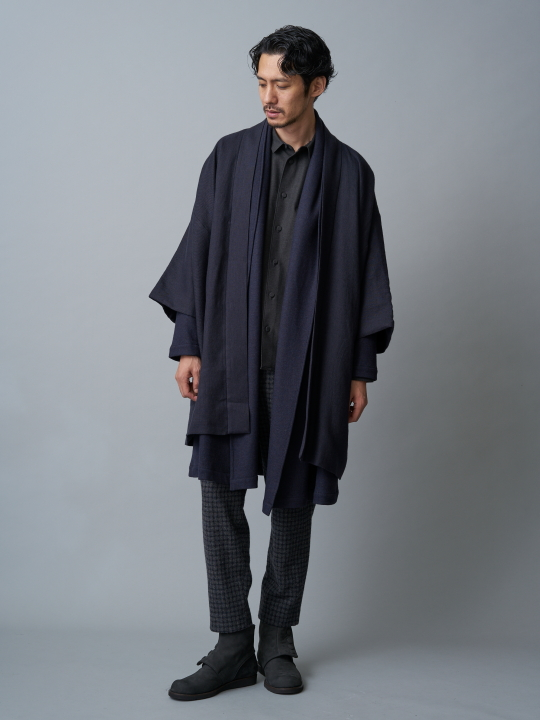
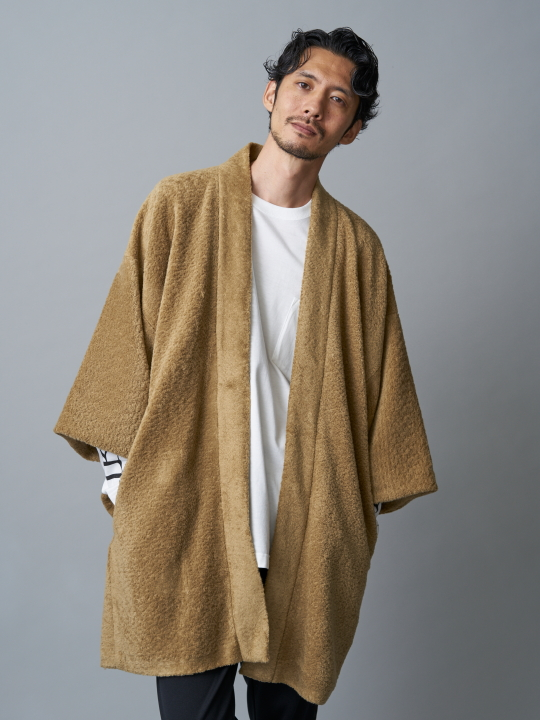
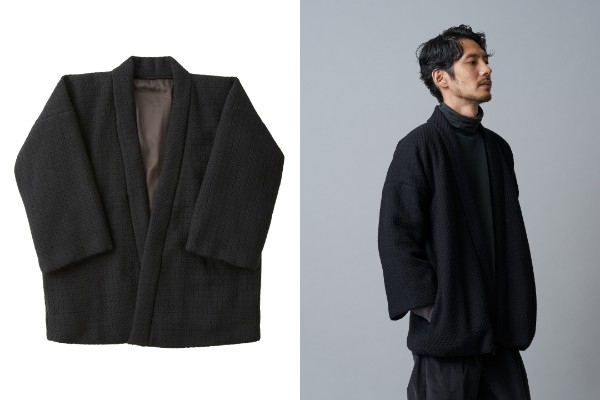
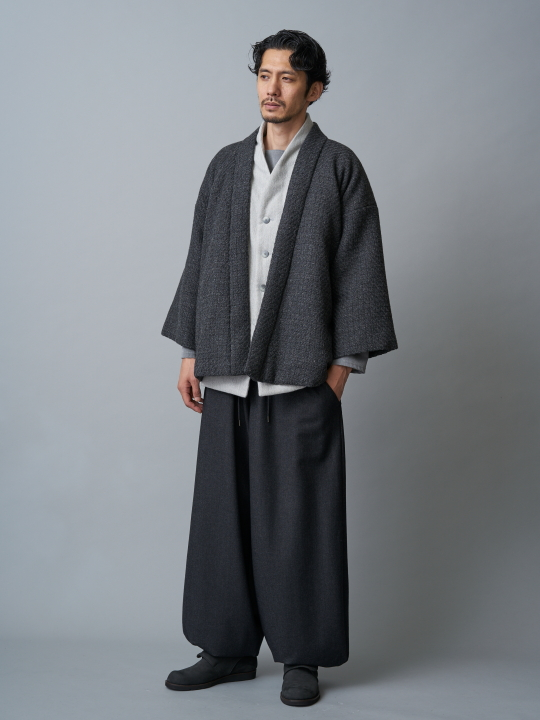
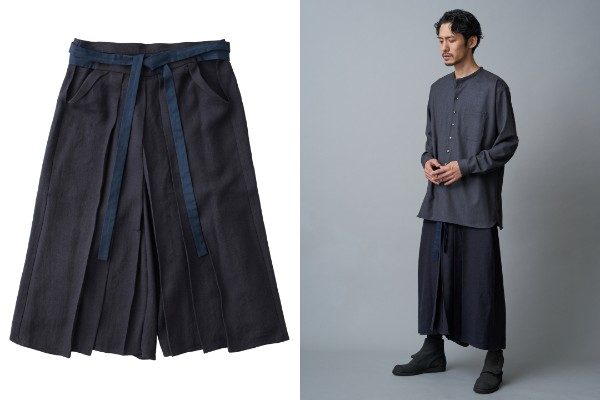
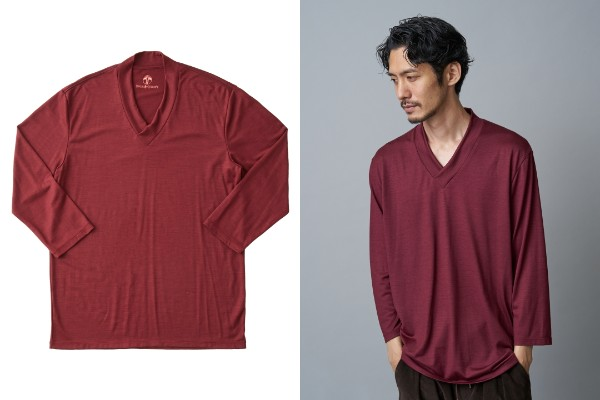
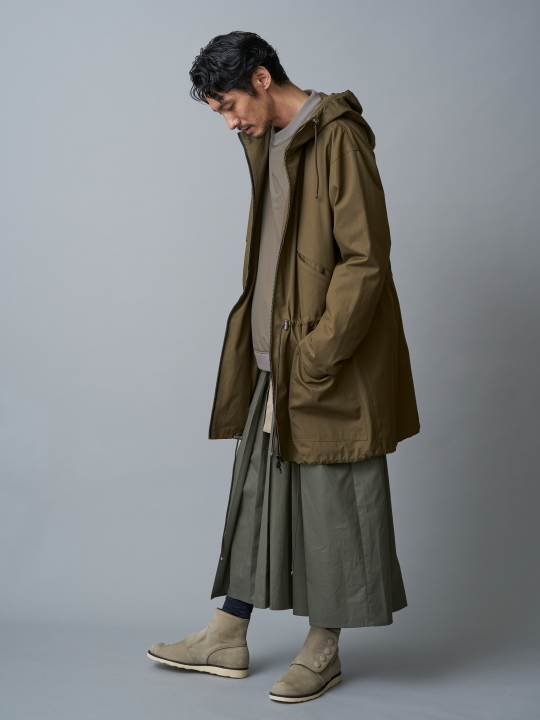
 Japanese fashion company’s modernized haori half coats will keep you warm and samurai chic
Japanese fashion company’s modernized haori half coats will keep you warm and samurai chic Japanese fashion brand Trove releases first-ever unisex range of modern samurai coats and pants
Japanese fashion brand Trove releases first-ever unisex range of modern samurai coats and pants Japanese fashion company brings modern-day samurai look to your legs with hakama chino pants
Japanese fashion company brings modern-day samurai look to your legs with hakama chino pants Pikachu special kimono plushie is only available one way, hopes to spread love of Japanese chess
Pikachu special kimono plushie is only available one way, hopes to spread love of Japanese chess Muji adds Japanese haori samurai coats to their casual wear collection
Muji adds Japanese haori samurai coats to their casual wear collection Japan’s new difficult-to-drink-from beer glass protects your liver, but it’s a brutal experience
Japan’s new difficult-to-drink-from beer glass protects your liver, but it’s a brutal experience Hello, cosmetics! Clinique teams up with Hello Kitty this summer for first-time collaboration
Hello, cosmetics! Clinique teams up with Hello Kitty this summer for first-time collaboration How to order snacks on a Shinkansen bullet train in Japan
How to order snacks on a Shinkansen bullet train in Japan Demon Slayer: Kimetsu no Yaiba gets new roller coaster attractions and food at Universal Studios Japan
Demon Slayer: Kimetsu no Yaiba gets new roller coaster attractions and food at Universal Studios Japan New samurai glasses are Japan’s latest weird must-have souvenir
New samurai glasses are Japan’s latest weird must-have souvenir Burger King Japan suddenly adds Dr. Pepper and Dr. Pepper floats to its menu nationwide
Burger King Japan suddenly adds Dr. Pepper and Dr. Pepper floats to its menu nationwide New Nintendo Lego kit is a beautiful piece of moving pixel art of Mario and Yoshi【Photos】
New Nintendo Lego kit is a beautiful piece of moving pixel art of Mario and Yoshi【Photos】 What do you eat when you catch a cold? We asked 11 of our Japanese reporters
What do you eat when you catch a cold? We asked 11 of our Japanese reporters High-fashion Totoro cuddle purse is like an elegant stroll in the forest【Photos】
High-fashion Totoro cuddle purse is like an elegant stroll in the forest【Photos】 Why Japanese doesn’t need swear words
Why Japanese doesn’t need swear words Nintendo history you can feel – Super NES, N64, and GameCube controllers become capsule toys
Nintendo history you can feel – Super NES, N64, and GameCube controllers become capsule toys “The most Delicious Cup Noodle in history” – Japan’s French Cup Noodle wins our heart【Taste test】
“The most Delicious Cup Noodle in history” – Japan’s French Cup Noodle wins our heart【Taste test】 Starbucks releases a cute Frappuccino and Unicorn Cake…but not in Japan
Starbucks releases a cute Frappuccino and Unicorn Cake…but not in Japan Kyoto Tower mascot termination reveals dark side behind cute Japanese characters
Kyoto Tower mascot termination reveals dark side behind cute Japanese characters McDonald’s Japan’s Soft Twist Tower: A phantom ice cream only sold at select branches
McDonald’s Japan’s Soft Twist Tower: A phantom ice cream only sold at select branches Yabai Ramen: What makes this Japanese ramen so dangerous?
Yabai Ramen: What makes this Japanese ramen so dangerous? Finally! Nintendo Japan expands Switch 8-bit controller sales to everybody, Online member or not
Finally! Nintendo Japan expands Switch 8-bit controller sales to everybody, Online member or not Japanese government wants to build luxury resorts in all national parks for foreign tourists
Japanese government wants to build luxury resorts in all national parks for foreign tourists To combat declining birth rate, Japan to begin offering “Breeding Visas” to foreigners
To combat declining birth rate, Japan to begin offering “Breeding Visas” to foreigners 10 things you should buy at 7-Eleven in Japan
10 things you should buy at 7-Eleven in Japan Studio Ghibli releases anime heroine cosplay dresses that are super comfy to wear
Studio Ghibli releases anime heroine cosplay dresses that are super comfy to wear Woman charged for driving suitcase without a license in Osaka
Woman charged for driving suitcase without a license in Osaka Studio Ghibli unveils My Neighbour Totoro miniature house model
Studio Ghibli unveils My Neighbour Totoro miniature house model Kyoto experiencing problems with foreign tourists not paying for bus fares, but not on purpose
Kyoto experiencing problems with foreign tourists not paying for bus fares, but not on purpose Fighting mild hunger with a Japanese soda that turns into jelly in the stomach【Taste test】
Fighting mild hunger with a Japanese soda that turns into jelly in the stomach【Taste test】 Studio Ghibli’s Howl’s Moving Castle tapestry unveiled in Japan for first time
Studio Ghibli’s Howl’s Moving Castle tapestry unveiled in Japan for first time McDonald’s new Happy Meals offer up cute and practical Sanrio lifestyle goods
McDonald’s new Happy Meals offer up cute and practical Sanrio lifestyle goods Sales of Japan’s most convenient train ticket/shopping payment cards suspended indefinitely
Sales of Japan’s most convenient train ticket/shopping payment cards suspended indefinitely Sold-out Studio Ghibli desktop humidifiers are back so Totoro can help you through the dry season
Sold-out Studio Ghibli desktop humidifiers are back so Totoro can help you through the dry season Japanese government to make first change to romanization spelling rules since the 1950s
Japanese government to make first change to romanization spelling rules since the 1950s Foreigner’s request for help in Tokyo makes us sad for the state of society
Foreigner’s request for help in Tokyo makes us sad for the state of society Ghibli founders Toshio Suzuki and Hayao Miyazaki contribute to Japanese whisky Totoro label design
Ghibli founders Toshio Suzuki and Hayao Miyazaki contribute to Japanese whisky Totoro label design Doraemon found buried at sea as scene from 1993 anime becomes real life【Photos】
Doraemon found buried at sea as scene from 1993 anime becomes real life【Photos】 Tokyo’s most famous Starbucks is closed
Tokyo’s most famous Starbucks is closed Princesses, fruits, and blacksmiths: Study reveals the 30 most unusual family names in Japan
Princesses, fruits, and blacksmiths: Study reveals the 30 most unusual family names in Japan Walk the streets of Japan in style with bushido-influenced men’s summer kimono range from Kyoto
Walk the streets of Japan in style with bushido-influenced men’s summer kimono range from Kyoto Chic samurai coats from Japan are here to keep fashion warriors warm through the winter
Chic samurai coats from Japan are here to keep fashion warriors warm through the winter Wazigen Shizukaya’s latest collection of modern men’s kimono make a move for high fashion
Wazigen Shizukaya’s latest collection of modern men’s kimono make a move for high fashion Does a denim kimono look or feel good? Our kimono neophyte reporter finds out【Photos】
Does a denim kimono look or feel good? Our kimono neophyte reporter finds out【Photos】 Japanese fashion label’s samurai chino pants are on the move again with new colors
Japanese fashion label’s samurai chino pants are on the move again with new colors New Japanese kimono-style hakama roomwear comes with men’s styles for summer
New Japanese kimono-style hakama roomwear comes with men’s styles for summer New spring and summer line of Outdoor Kimono offers a traditionally modern way to chill outside
New spring and summer line of Outdoor Kimono offers a traditionally modern way to chill outside Modern samurai fashion brand Wazigen Shizukuya’s summer collection makes old-meets-new splash
Modern samurai fashion brand Wazigen Shizukuya’s summer collection makes old-meets-new splash Stay home in style with Kyoto-easy hakama-inspired roomwear for men, women, and kids【Photos】
Stay home in style with Kyoto-easy hakama-inspired roomwear for men, women, and kids【Photos】 Japanese shrine maidens in Osaka spotted wearing unusual costumes during winter
Japanese shrine maidens in Osaka spotted wearing unusual costumes during winter Kimono panties are here to add a little Japanese tradition to your lingerie rotation
Kimono panties are here to add a little Japanese tradition to your lingerie rotation Dress like your favourite Lupin III character with suits and kimono designed by Japanese tailors
Dress like your favourite Lupin III character with suits and kimono designed by Japanese tailors Fashion brand Dsquared2 reveals new samurai armor-inspired line-up
Fashion brand Dsquared2 reveals new samurai armor-inspired line-up Uniqlo’s new “communist dictator” jacket has Japanese commenters confused and snickering【Photos】
Uniqlo’s new “communist dictator” jacket has Japanese commenters confused and snickering【Photos】 Samurai backpacks from Kyoto combine lamellar tradition, awesome style, and modern functionality
Samurai backpacks from Kyoto combine lamellar tradition, awesome style, and modern functionality
Leave a Reply